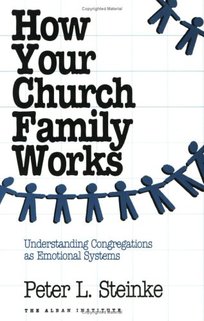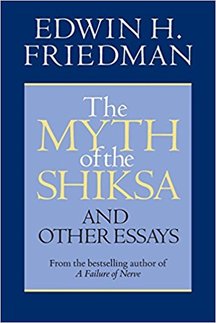My introduction into Bowen Family Systems Theory came through Rev. Peter Steinke. It was at a workshop in Madison, WI around the time his second book Healthy Congregations was published. I attended the conference at the invitation of a staff member of my annual conference.
As a not-quite-ordained pastor, fresh out of seminary, the ideas and concepts Steinke presented made sense. He gave language to a reality I knew intuitively. I remember writing down the phrase, "Good leadership rises above the anxiety of the group." I carried it around with me for months. That one simple phrase propelled me into twenty years of learning Bowen Family Systems Theory.
Peter Steinke was a "student" of Rabbi Ed Friedman. In the preface to the 2006 reprint of the How Your Church Family Works (originally published in 1993), Steinke writes, "In 1991, I asked him (Friedman) why he didn't abridge his book Generation to Generation and write a short version of it so that it could be available to more people. He saw no need to do it since the book had had multiple printings. 'You,' he said to me, 'could write the short version.' With his encouragement, I contacted the Alban Institute and How Your Church Family Works was written."
I learned a few years go, at a conference attended by Steinke and hosted by the group Voyagers that Steinke's initial exposure to theory was through Ron Richardson.
After attending the Madison conference, I read all of Steinke's published works. Soon after receiving a flyer in the mail from a local organization, I attended a Healthy Congregation seminar based on the writings of Steinke. I'll save the rest of the story for another blog post.
Like the other authors I've highlighted (see the last two blog posts), it's impossible to find just one section of Steinke's writings to represent his works. I selected an excerpt from his first book, How Your Church Family Works. As I've read Steinke, and listened to him speak over the years, I've been struck by his desire to connect theology and systems thinking.
This excerpt is taken from the last chapter, "Believing and Belonging" and the section on "Response and Recovery." He writes:
"Systems theory provides no magical answers," Murray Bowen remarks, "but it does provide a different way of conceptualizing human problems." We learn that in relationship we do not act completely on our own "steam." Nor do we always express ourselves, simply because of our "nature." Environment is always an influence. "It is the context," Gregory Bateson contends, "that fixes meaning." We are constantly influencing the behaviors of others and likewise being influenced by them. Looking at what takes place between people, we observe the reciprocal influences and the mutual reinforcement of functioning positions. This does not mean that there is no sense of individual responsibility. If anything, system thinking elevates the need to be responsible. Individually, we decide who will or will not be allowed in our personal space, what we will stand for and what will not be tolerated, and how far or close the sphere of influence will be negotiated. Being responsible, for example, we set our own limits, not someone else's. We regulate our own anxiety rather than assigning it to others in the form of criticisms or fault-finding. We look at how we can change ourselves instead of how we can force or manipulate others to make changes in themselves. This is more than psychology. It goes to the very core of creation theology, that we are created to be responsible creatures. One of the words that church has used to distinguish responsible living is "stewardship." A stewards is a manager of what is given. Our primary responsibility is the management of our own life and the relationships we form - anxiety and all.


 RSS Feed
RSS Feed